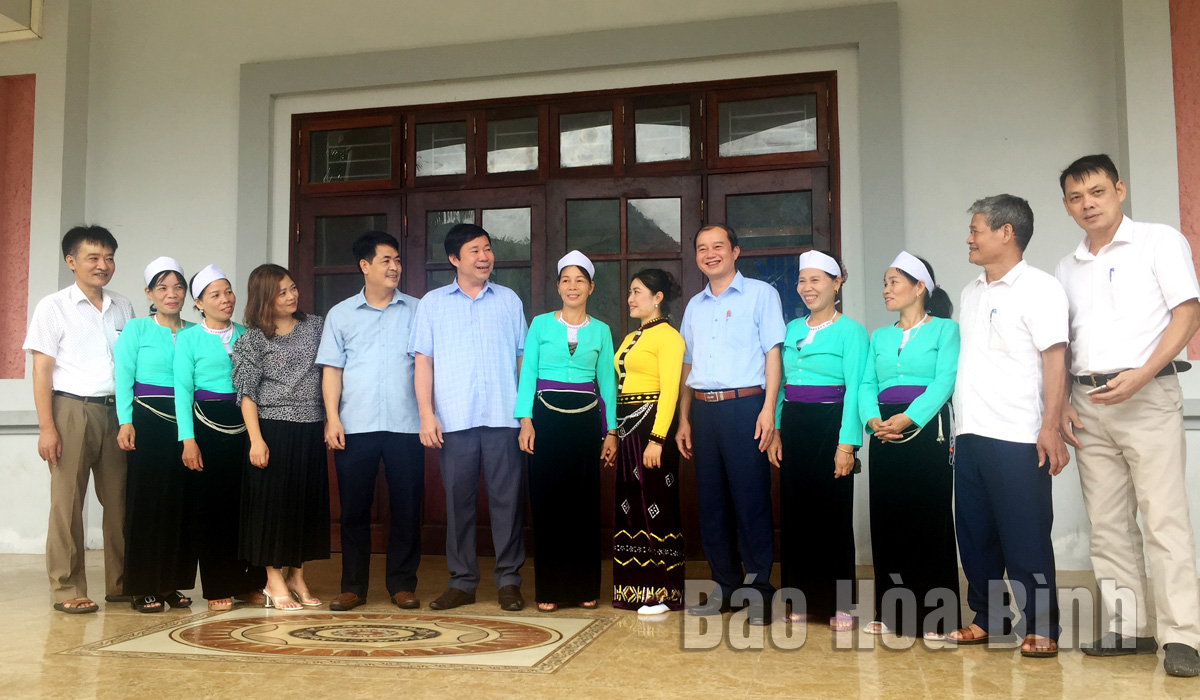
(HBO) – The Hoa Binh hydropower plant is considered a brilliant example of the Vietnamese people’s bravery, creativity and industriousness to weather every difficulty and challenge, and forever a pride of the country. The plant construction was carried out smoothly partly thanks to the particularly enormous contributions by people of different ethnic groups in Da Bac district.
Leaders of the Party Committee and People’s Committee of Da Bac district talk to residents in the communes near the Da River reservoir.
In a recent interview granted to the Hoa Binh Newspaper on the occasion of 40 years since the relocation of residents to serve the plant construction, Bui Van Luyen, member of the Hoa Binh provincial Party Committee, Secretary of the Party Committee and Chairman of the People’s Council of Da Bac district, said until now, the resettlement to serve the building of the Hoa Binh hydropower plant remains the largest of its kind in Vietnam in the post-war period.
Da Bac was considered the centre of that resettlement since most of local residents lived near the old National Highway 6 that ran along the Da River. At that time, 18 of its 23 communes were located on the banks of this river, and seven had to completely move out of the area zoned for the plant’s reservoir.
From 1982 to 1986, the district completed the relocation of 2,365 households with 12,397 people, 3,700 graves and tens of thousands of square metres of housing in 60 villages in 18 of the 23 communes. The task was carried out swiftly with high consensus from locals, which was thanks to communications activities and leading good examples by cadres and Party members in following the Party and Government’s resettlement policy. It is noteworthy that the State almost didn’t have to pay compensation for site clearance but only needed to offer small aid, according to the official.
He went on to say that after 40 years, it could not be said that local residents have been completely free of hardships, but thanks to efforts, consensus and solidarity of the district’s Party organisation, administration and people, Da Bac has enjoyed stable socio-economic development.
So far, all communes have had concrete and asphalt roads reaching their centres while over 70% of irrigation canals and ditches have been concretised. The annual per capita income has risen to 29.8 million VND (nearly 1,300 USD). Four communes in the district have been recognised as new-style rural areas, five residential areas as role models, and six products rated three - four stars under the One Commune, One Product (OCOP) programme.
The district has also invested resources in educational development and now has 25 of the 47 schools (accounting for 53%) meeting national standards. The grassroots healthcare network has continued to be upgraded to meet people’s demand for medical examination and treatment. Meanwhile, health insurance has covered more than 95% of the local population.
Authorities have also paid attention to caring for disadvantaged people and families of revolution contributors, effectively carried out the policy for ethnic minorities and the national target programmes, and guaranteed political security and social order and safety. Much improvement has also been recorded in the building of the Party, administration, Vietnam Fatherland Front and organisations, Luyen said.
In recognition of those achievements, on the occasion of 40 years since the resettlement of residents in the Da River reservoir, the Party organisation, administration and people of Da Bac have been rewarded with the third-class Labour Order by the State President.
This reward is a demonstration of the unceasing efforts by the district’s Party organisation, administration and people of all ethnic groups over the past years, the Chairman added./.
Hoa Binh province is undergoing a dynamic transformation amid Vietnam’s national digital transition. Building on Poliburo’s Resolution No. 57-NQ/TW on breakthroughs in science, technology, innovation, and national digital transformation, the province has rolled out a wide range of practical action plans. A standout initiative is the "Digital Literacy for All” movement, an effort to ensure that no one is left behind in the digital era.
Hoa Binh province is undergoing a dynamic transformation in the wake of the national digital transformation movement. Building on Resolution No. 57-NQ/TW of the Politburo on breakthroughs in science, technology, innovation, and national digital transformation, the province has implemented a wide range of practical action plans. A standout initiative is the "Digital Literacy for All” movement ambitious effort to ensure that no one is left behind in the digital age.
With a spirit of unity and proactive problem-solving, the Party Committee, the government and the people of Dong Lai Commune (Tan Lac District) have made great strides in implementing the resolutions of the 24th Party Congress of the commune for the 2020 - 2025 term. Focusing on leadership and practical actions, the commune has brought the Party’s resolutions into daily life, creating strong impacts and pushing the local development forward.
Amid the nationwide push for digital transformation, young people in Hoa Binh Province are stepping up as dynamic pioneers, applying technology to enhance Youth Union operations and expand the reach of youth-led initiatives. Through creativity and adaptability, Youth Union organizations at all levels have introduced a series of practical solutions, contributing to modern governance and community development.
In recent years, An Nghia commune, located in Lac Son district, has stepped up administrative reform, focusing on improving the quality and efficiency of its single-window service unit for receiving and processing administrative procedures. These improvements have helped create favourable conditions for local residents and organisations to handle administrative procedures, contributing to the commune’s broader socio-economic development.
The Prime Minister-approved master plan to develop the multi-use value of forests ecosystems through 2030, with a vision to 2050, aims to improve the management and sustainable use of forest resources, create jobs, increase incomes, and improve the living standards of ethnic minorities, people in mountainous and remote areas, forest workers and those living near forests.



